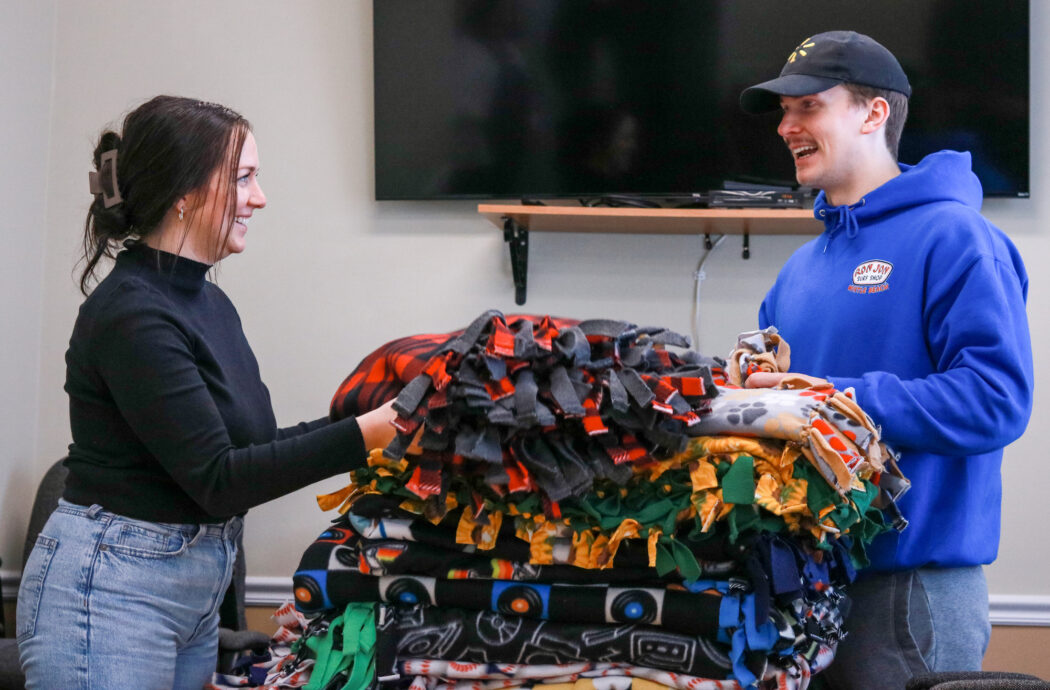Volunteering with hospice: how USU students are making a difference
Hospice care is the term for end-of-life care, especially focused on making the quality of life for patients the best it can be as they pass on. Hospice care is focused on making the last stages of incurable illnesses as comfortable and peaceful as possible. Because of this general goal of making patients’ lives better, hospice provides a perfect space for volunteer work.
Utah State University students Brenna Bailey and Mason Jones decided that for their leadership class project, they wanted to do a service project for hospice patients, which led them to meet Anna Trappett, a Community Nursing Services volunteer coordinator, who helped them organize their project.
The two students made ten blankets, and took 11 hours to complete them. The experience was long and time-consuming, but when asked in an interview, Brenna Bailey, a senior in marketing, was happy with what they had accomplished.
“I really gained an appreciation for the people willing to help and do things like this, with all that CNS is doing and helping these people in their last days and help them enjoy it — to live the best lives that they can. I just learned a lot about the value of life and friendship,” Bailey said.
When asked, Bailey said she was surprised at how easy it was to volunteer and that there were so many ways to help.
“You can do service and volunteer work were ever you find it; it doesn’t have to be only spending four hours on a Saturday working in a soup kitchen. You can make blankets, trinkets or even little cards, or just go visit someone. It’s those little acts of service that can make someone’s day and change them for the better,” Bailey said.
Mason Jones, a senior in finance, was also really happy with their work and mentioned what he thinks he got the most out of the experience.
“There is really no other type of good feeling that is as great as just service. That’s been hammered into my head since I was a kid, but actually seeing and experiencing it is pretty cool,“ Jones said.
When asked about what he thinks the benefits of volunteer work for anybody interested in helping, Jones said that helping others makes you feel great.
“It truly makes your life a lot better when you see how you have made another’s life better,” Jones said.
Jones said that he thinks volunteer work is really amazing way to help people and that it is equally helpful to the people doing the service.
“I truly think that everyone should have an opportunity like this. I think that it should be — not required — but heavily encouraged for everyone to try and get out and serve others. All of us can make a difference,” Jones said.
Anna Trappett is a registered nurse who has been associated with hospice for about 40 years and acts as the volunteer coordinator for Community Nursing Services. In an in-person interview, she said that there are so many ways to help and that there is a place for everyone in service.
Trappett explained the process for new volunteers interested in hospice service and how broadly anyone can help.
“As a hospice volunteer, firstly, they’ll get an orientation about what hospice really is and what they may be seeing with these patients who are at end of life. They will be given a case — or two, depending on what their time allows them to have — and students can pretty much do what they would like as long as the patient wants it as well. The patient may want to be read to. Some patients enjoy music, so some of the volunteers will share music, whether that is their musical talents like playing the piano or the guitar. Others have just downloaded music to their devices, and sat and shared music with the patients, and talked about certain pieces of music. Some do crossword puzzles, others do projects, like these quilts these students have done,” Trappett said.
Trappett explains that new volunteers can expect to focus on what they want to do with their service, whether it is just to serve or if it is to further their education.
“I tailor each student’s experience to what their major is. So if they are in biology and looking at getting into medicine, we’ll talk about the medical issues, well talk about the disease process, we’ll talk about the drugs. If I have a psychology student, we’ll tailor it to them; we’ll talk about the environmental — the psychosocial needs of the patient— the psychosocial needs of the family. So I pull in this experience, not just focused on the patient, but they’re seeing a well-rounded picture of the patient, the caregivers, the environment and the psychosocial needs. We just pull it all together so the experience isn’t just a visit to the patient; you’re going to walk away understanding a whole lot more about the disease process and the needs of the patient,” Trappett said.
Trappett expressed that volunteering is amazing for all parties involved and that CNS is always looking for volunteers.
“I think it is a win-win situation. The students walk away from this with the gain of having a wonderful association with these patients, and I think they learn a little bit more about themselves. And obviously, learn a little bit more about the systems that are out there for people who are terminally ill,” Trappett said.
If you, or anyone that you know, is interested in volunteering with CNS, you can reach out and contact them by calling 435-752-3355, or you can contact Trappett by email at Anna.Trappett@cns-cares.org.

